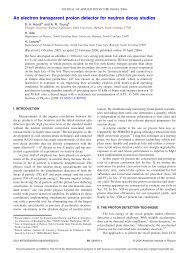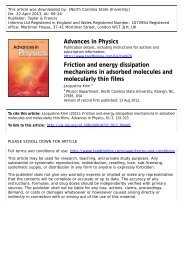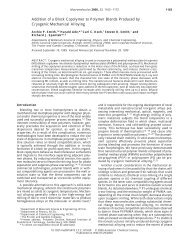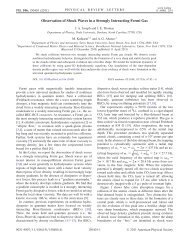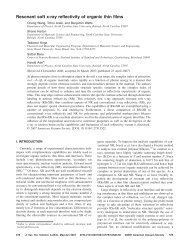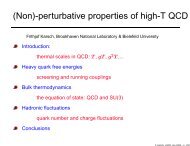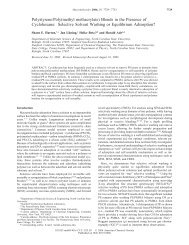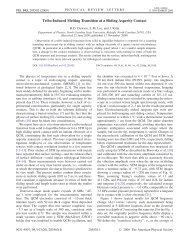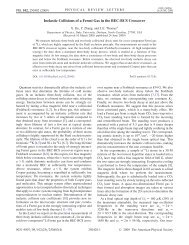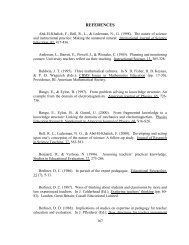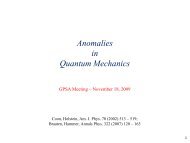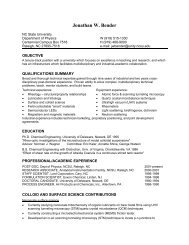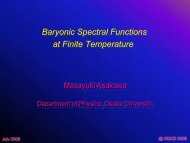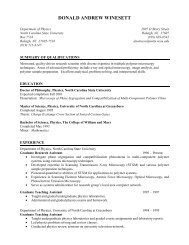Physics Graduate Brochure - Physics - North Carolina State University
Physics Graduate Brochure - Physics - North Carolina State University
Physics Graduate Brochure - Physics - North Carolina State University
You also want an ePaper? Increase the reach of your titles
YUMPU automatically turns print PDFs into web optimized ePapers that Google loves.
to exotic neutron scattering instruments. His current<br />
experimental work is focused on ultracold neutrons,<br />
3 He NMR, and the development of imaging<br />
techniques for the nEDM project. He is also working<br />
on the design and construction of an apparatus to<br />
study the interaction of UCN with 3 He as a prototype<br />
for the search for the nEDM project.<br />
(rgolub@ncsu.edu)<br />
David Haase<br />
Prof. Haase employs experimental techniques in low<br />
temperature and condensed matter physics in the study<br />
of the properties of neutrons and nuclei. He and his<br />
students have constructed refrigerators and devices to<br />
polarize nuclear targets for neutron scattering<br />
experiments. His current project is the development<br />
of the cryogenic systems for the neutron electric<br />
dipole moment (nEDM) experiment that is being<br />
prepared for construction at Oak Ridge National<br />
Laboratory. (david_haase@ncsu.edu)<br />
Paul Huffman<br />
Prof. Huffman is the technical coordinator and deputy<br />
contract project manager for the nEDM project. He is<br />
also the leader of the NIST lifetime experiment, which<br />
magnetically traps ultracold neutrons produced in<br />
superfluid helium and then measures their decay in<br />
situ to extract the neutron lifetime. Prof. Huffman is<br />
also involved in the development of the fundamental<br />
nuclear physics beamline at the Spallation Neutron<br />
Source at Oak Ridge National Laboratory. His<br />
research spans a wide range of neutron-related topics,<br />
and also includes the measurement of coherent<br />
scattering amplitudes in low-Z nuclei, fundamental<br />
symmetries tests in nuclei, and the use of thermal<br />
neutrons for 3D imaging. (paul_huffman@ncsu.edu)<br />
John Kelley<br />
At the Triangle Universities Nuclear Laboratory, Prof.<br />
Kelley is involved in research utilizing the High<br />
Intensity Gamma-Ray Source (HIGS). In the tandem<br />
laboratory, neutron beam experiments are carried out<br />
to refine neutron reaction cross sections that are<br />
essential for projects in energy generation, national<br />
security, transmutation of waste, and basic research.<br />
At HIGS, high-resolution studies using Nuclear<br />
Resonance Fluoresence techniques (NRF) are<br />
searching for new levels. The beams from HIGS<br />
provide an excellent tool for discovering levels and<br />
characterizing their properties. In addition to studies<br />
of nuclei in the actinide region, recent NRF studies<br />
have focused on characterizing the pygmy dipole<br />
resonance, which is a collective excitation mode in<br />
some neutron-rich nuclei. He is also active in the<br />
Data Evaluation Group at the Triangle Universities<br />
Nuclear Laboratory. (kelley@tunl.duke.edu)<br />
Albert Young<br />
Prof. Young’s research uses neutrons and nuclei to<br />
probe aspects of the particle physics standard model.<br />
He helps lead the UCNA project at Los Alamos,<br />
which measures angular correlations in neutron decay<br />
using ultracold neutrons. He also helped develop the<br />
solid deuterium ultracold neutron source at Los<br />
Alamos (the only operating source of extracted<br />
ultracold neutrons in the U.S.), and he is involved in<br />
the construction of an ultracold neutron source at the<br />
PULSTAR reactor on NCSU campus. His research<br />
interests include neutrinoless double beta-decay,<br />
symmetry tests in nuclear beta-decay and some<br />
biomedical applications. (albert_young@ncsu.edu)<br />
Further Information<br />
We encourage interested applicants to learn more through the experimental nuclear physics group webpage,<br />
http://www.physics.ncsu.edu/experimentalnuclearphysics. Prospective students can contact any faculty member<br />
directly (see email addresses above) or the <strong>Graduate</strong> Program office at py-grad-program@ncsu.edu.<br />
.NC STATE <strong>Physics</strong>.<br />
www.physics.ncsu.edu



